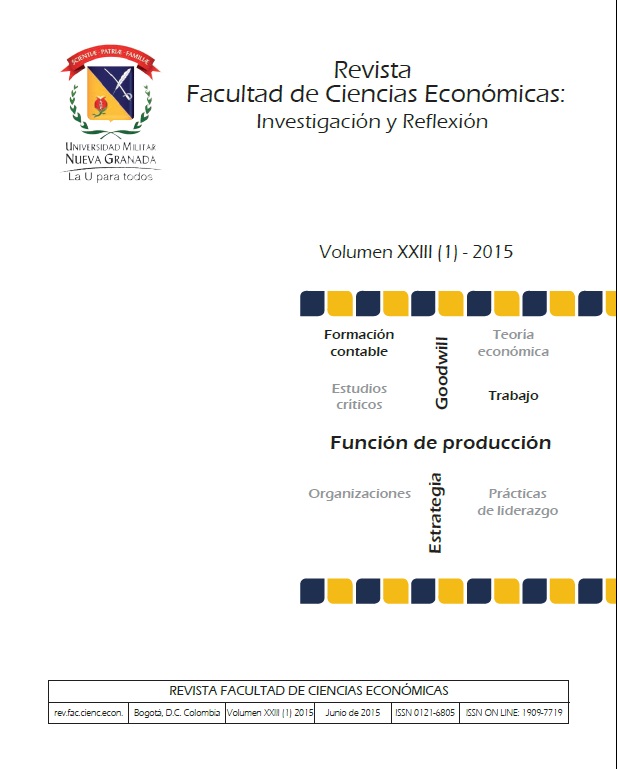An analytical review about the role of land in the economic theory of David Ricardo
Abstract
The main objective of this paper is to analyze the resource of land from the economic theory of Da- vid Ricardo as a first approach to the economic analysis of natural resources. This is done through an analytic review of the literature on the work of Ricardo and other authors that have covered this subject. In this sense, the concept of ground rent is examined as well as the approaches around the so-called law of diminishing returns. Also, some critical thoughts are established about the approach to land rent. The results show that the concept of opportunity cost is absent from Ricardo’s work on the income of land which implies a conceptual reconsideration on the income, in order to encom- pass the economic analysis on natural resources.
Downloads
References
Alfranca, O. (2012). Evolución del pensamiento económico sobre los recursos naturales. En: Nuevas Corrientes del Pensamiento Económico, ICE, N° 865, marzo-abril: 79-90.
Benegas-Lynch, A. (1998). Bienes públicos, externalidades y los free-riders: el argumento reconsiderado. En: Estudios Políticos, N° 71: 203-218.
Birmingham, W. (1978). Introducción a la economía. México. Siglo XXI Editores.
Blaug, M. (2001). Teoría económica en retrospección. México. Fondo de Cultura Económica.
Cannan, E. (1942). Historia de la teoría de la producción y la distribución en la economía política inglesa. México. Fondo de Cultura Económica.
Costanza, R., Cumberland, J., Daly, H., Goodland, R. & Noorgard, R. (1999). Una introducción a la economía ecológica. México. Editorial Cecsa.
Gray, L. (1914). Rent under assumption of exhaustibility. En: Quarterly Journal of Economics, 28: 466-489.
Hahne-Rima, I. (1995). Desarrollo del análisis económico Quinta edición. Madrid. Editorial Irwin.
Hartwick, J. (1977). Intergenerational equity and the investing of rents form exhaustible resources. En: American Economic Review, 67(5): 972-974.
Hartwick, J. (1997). The economics of natural resource use. Massachusetts. Addison Wesley Publishers.
Hotelling, H. (1931). The economics of exhaustible resources. En: Journal of Political Economy, (39): 137-175.
Huerta, R. (2001). De nuevo los rendimientos decrecientes. En: Aportes, 6(18): 73-90.
Mendoza, W. (2011). La política impositiva aplicable a los minerales y al petróleo: teoría, experiencias y propuesta de política para el Perú, Lima. Pontificia Universidad Católica del Perú. Consorcio de investigación económica y social (CIES).
Pearce, D. (2002). An intelectual history of environmental eco- nomics. En: Annual Review of Energy and the Environment, Palo Alto, (27): 57-81.
Pereira, M., Ulloa, A., O´Ryan, R. & De Miguel, C. (2009). Síndrome holandés, regalías mineras y políticas de gobierno para un país dependiente de recursos naturales: el cobre de Chile. En: Medio ambiente y desarrollo. CEPAL. Serie N° 140.
Pindyck, R. & Rubinfeld, D. (2001). Microeconomía. 5° Edición. Madrid. Prentice Hall.
Ricardo, D. (1993). Principios de economía política y tributación. Bogotá. Fondo de Cultura Económica.
Riera, P. (2005). Manual de economía ambiental y de los recursos naturales. Madrid. Thomson Editores.
Samuelson, P. & Nordhaus, W. (2002). Microeconomía, Décimo séptima edición. México. Mc Graw Hill.
Schuldt, J. (2004). Regalías mineras y rentas ricardianas. SUNAT, 2013. Disponible en: www.sunat.gob.pe











